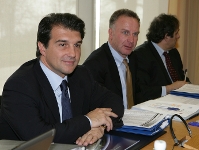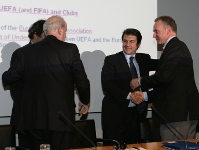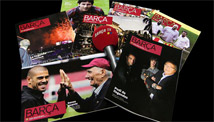FCBARCELONA.CAT
Main menu

Content menu
Club
08.08.2008 12:25
Stalwart defender of the clubs
www.fcbarcelona.cat
FC Barcelona’s steadfastness over the release of Messi is another example of the club’s leadership in defending its own interests and those of other clubs.
The ruling of the Court of Arbitration for Sport (CAS) in favour of Barça about the release of Leo Messi is another example of the importance it attaches to the defence of its own interests and those of other clubs.
The CAS’s ruling against the clubs being forced to release players for the Olympics comes after the club’s firm defence of its rights.
This is part of Barça’s strategy which has led it to taking a leading role in the creation of the ECA, getting financial compensation for players playing in internationals and social dialogue in the world of football.
Strength through ECA
 At the first full assembly of the
ECA (European Clubs Association), held at the start of July, club chairman Joan Laporta was
unanimously elected as first vice-chairman and head of the Institutional Relations Working Group.
The club’s director of football, Raül Sanhlleí, is also a member of the Social Dialogue in
Football Committee.
At the first full assembly of the
ECA (European Clubs Association), held at the start of July, club chairman Joan Laporta was
unanimously elected as first vice-chairman and head of the Institutional Relations Working Group.
The club’s director of football, Raül Sanhlleí, is also a member of the Social Dialogue in
Football Committee.
The ECA, which was set up in January 2008, consists of more than 100 clubs from the 53 associations represented in UEFA and is designed to be more representative than the old G-14 and more independent than the former UEFA body called the European Club Forum.
Financial compensation
Getting money for releasing players to their national sides is one of the issues which FC Barcelona has fought most for. This revenue is the result of the talks which were successfully concluded at the start of the year.
The first results of the agreement between international bodies and clubs came with Euro 2008, with Barça being one of the clubs to make most money as it took in almost €1 million.
Social dialogue
On 1 July the first European meeting about social dialogue in professional football was held in Paris.
Representatives of the clubs through ECA, of the Leagues through the EPFL, and the players through FIFPRO and UEFA, began a new stage of greater understanding especially in terms of employment.
One of the keys to the participation of the clubs in this social dialogue took place beforehand when on 18 June Karl-Heinz Rummenigge, chairman of the ECA, and Joan Laporta, as first vice-chairman, met with European commissioner Vladimir Spidla to achieve full recognition for the participation of the clubs as active social agents.

European recognition
“Europe views Barça as a pioneer,” said Karl-Heinz Rummenigge, chairman of the ECA, at
its most recent meeting at the Camp Nou. Top clubs and organisations see Barça and its chairman
Joan Laporta as one of the driving forces behind the clubs’ push to gain more strength, say
and relevance in world football. For Barça, defence of the rights of clubs is crucial and this is,
has been and will continue to be the strategy of the club.

